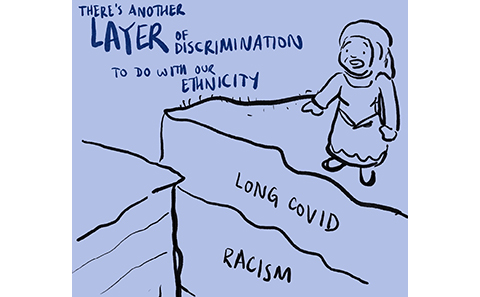Study Reveals Interplay of Covid-19 Stigma, Racism, and Discrimination in Healthcare Access for Ethnic Minority Long Covid Patients
New research has found that the stigma of Covid-19, racism, and discrimination in healthcare have impacted the ability of ethnic minority patients to access healthcare for Long Covid symptoms.
The study, by researchers at the University of Southampton and collaborators across the country, found additional barriers included feeling unworthy of receiving care, not having enough information about Long Covid, and a lack of awareness of healthcare options for coping with the chronic condition.
There are an estimated 1.9 million people living with Long Covid in the UK, according to the Office for National Statistics. The prevalence of Long Covid in minority ethnic groups is mixed, though research suggests people from these groups are less likely to seek healthcare.
People from ethnic minority backgrounds living with Long Covid symptoms frequently have poor experiences of healthcare, the research has found. This is despite minorities being one of the groups in the UK most exposed to acute Covid-19 infection.
Previous negative experiences of healthcare can lead to a loss of trust in the NHS, which negatively affects access to Long Covid support, and deepens health inequalities.
The study – by researchers from the University of Westminster, the University of Southampton, Keele University and Queen Mary University of London – reveals that empathy, validation and fairness from healthcare professionals in recognition of symptoms are key to gaining the trust of minority ethnic patients.
Study co-author Nisreen Alwan, Professor of Public Health from the University of Southampton who was made an MBE in 2021 for services to medicine and public health during the pandemics, said: “Clinicians and service providers must become aware of the complex nature of Long Covid including patient feelings of self-doubt, experiences of stigma, dismissal and isolation that can add to the health inequalities that affect minority ethnic groups in the UK.”
Dr Nina Smyth from the University of Westminster, which led the study, said: “Our study sheds light on the lack of trust in healthcare that people from ethnic minority backgrounds endure, even in 2024. Acknowledging Long Covid suffering with empathy while validating symptoms will go a long way to restoring trust in healthcare.”
Professor Damien Ridge from the University of Westminster said: “We were struck by the lack of warmth and understanding minority ethnic patients were reporting. Professionals could improve things by consciously being alert to the need to be more welcoming and open to Long Covid patients.”
Professor Carolyn Chew-Graham from Keele University said: “Our work has important messages for clinicians in primary and specialist care, highlighting the need to recognise the impact consultations can have on future consulting behaviour, particularly in some ethnic groups. This work follows our contribution to the development of the Supporting Long Covid Care tool which encourages people to consider Long Covid as a cause for their symptoms and to seek help.”
Dr Dipesh Gopal of Queen Mary University of London said: “This research shines a spotlight on the need for clinicians to validate patient experiences, even if illnesses are not completely understood in the case of Long Covid. Having the time to care during a consultation to validate an experience can shape a person’s life experience with health and healthcare services. Policymakers should note that this is challenging during current NHS pressures.”
A patient advisor group was involved in all stages of the research. One patient advisor and GP, Ashish Chaudhry, from Lower Broughton Health Centre, Salford, said: “It is key that voices from those affected by the pandemic are heard. Whilst the pandemic is over, the suffering and the legacy of patient interactions with healthcare remain. Hopefully this study will raise awareness amongst health care professionals of some of the challenges patients face and enable compassionate care.”

